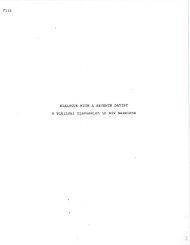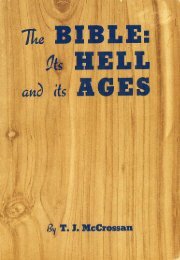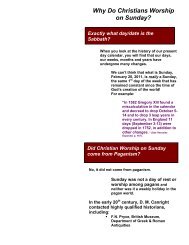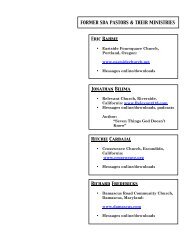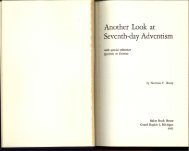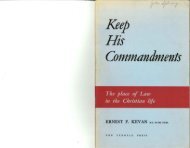Discovering the New Covenant by Greg Taylor - exAdventist Outreach
Discovering the New Covenant by Greg Taylor - exAdventist Outreach
Discovering the New Covenant by Greg Taylor - exAdventist Outreach
Create successful ePaper yourself
Turn your PDF publications into a flip-book with our unique Google optimized e-Paper software.
THE SABBATH IN THE GOSPELS<br />
Paul in <strong>the</strong> book of Galatians, in Colossians 2:16-17, and<br />
elsewhere in <strong>the</strong> Epistles.<br />
In Mark two we find this story repeated. Mark 2:27<br />
adds one statement, however. “The Sabbath was made for<br />
man and not man for <strong>the</strong> Sabbath.” Some Adventist<br />
scholars say this means that it was established at Creation<br />
and <strong>the</strong>refore a moral ought and binding for all time. But<br />
<strong>the</strong> problem with that interpretation is <strong>the</strong> linguistics study<br />
does not bear this out. Jesus is not making a universal<br />
statement here. He is basically saying that <strong>the</strong> Sabbath was<br />
made for man, not <strong>the</strong> o<strong>the</strong>r way around. The context<br />
teaches that Sabbath is not in <strong>the</strong> category of moral oughts.<br />
It is lumped in with <strong>the</strong> temporary or ceremonial system.<br />
This truth, right from <strong>the</strong> heart of Jesus’ Sabbath teachings,<br />
truly opened up to me a new paradigm. I had always<br />
studied <strong>the</strong>se passages with <strong>the</strong> agenda of showing that<br />
Sabbath must be <strong>the</strong> Lord’s Day. (Therefore <strong>the</strong> statement<br />
in Revelation 1:10 regarding <strong>the</strong> Lord’s Day must refer to<br />
<strong>the</strong> seventh-day Sabbath and not to Sunday). While doing<br />
that, I had missed <strong>the</strong> intended message from <strong>the</strong> passage.<br />
Jesus was plainly setting <strong>the</strong> stage for a fulfillment<br />
<strong>the</strong>ology.<br />
One more observation—<strong>the</strong> passage in Mat<strong>the</strong>w begins<br />
with Jesus calling Himself <strong>the</strong> Rest Provider. Mark’s<br />
account starts with this statement:<br />
And no one puts new wine into old wineskins; or else<br />
<strong>the</strong> new wine bursts <strong>the</strong> wineskins, <strong>the</strong> wine is spilled,<br />
and <strong>the</strong> wineskins are ruined. But new wine must be<br />
put into new wineskins. Mk. 2:22<br />
In Luke’s account of <strong>the</strong> same story, <strong>the</strong> same<br />
introduction is used. (Luke. 5:36-39) Jesus is teaching (<strong>the</strong><br />
Gospel writers understood it) that it is not possible to hang<br />
onto <strong>the</strong> old system and at <strong>the</strong> same time make room for <strong>the</strong><br />
true Sabbath, Jesus Christ. One or <strong>the</strong> o<strong>the</strong>r will have to<br />
give. No, Jesus does not directly say that <strong>the</strong> Sabbath will<br />
107



